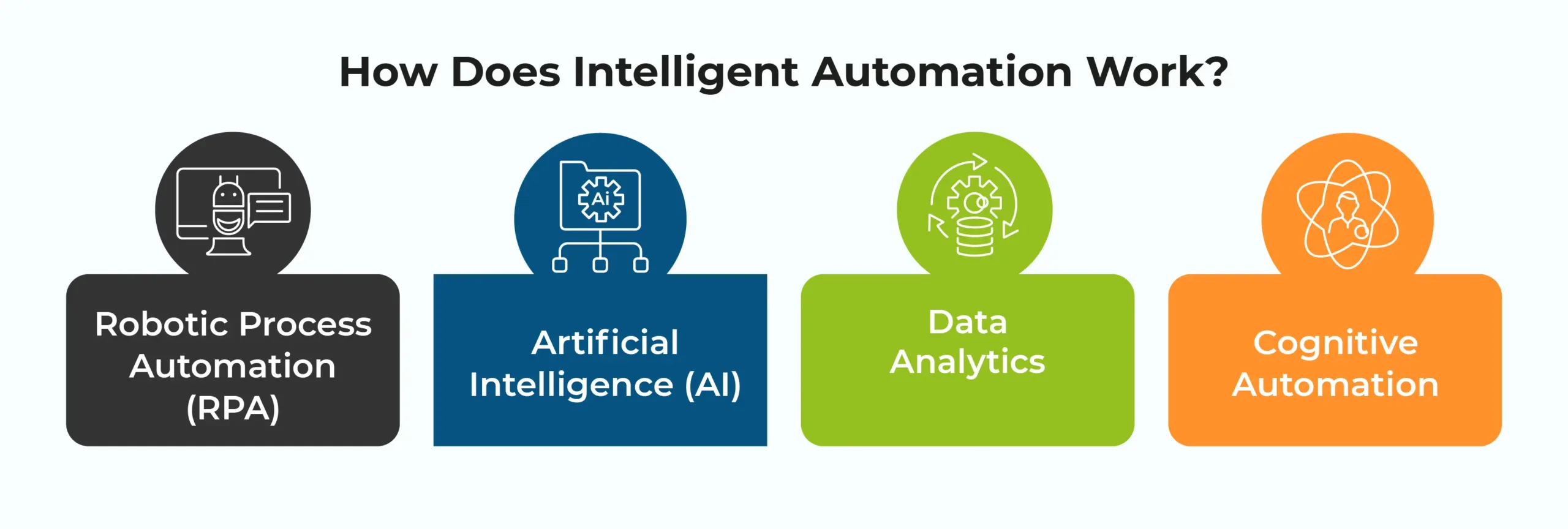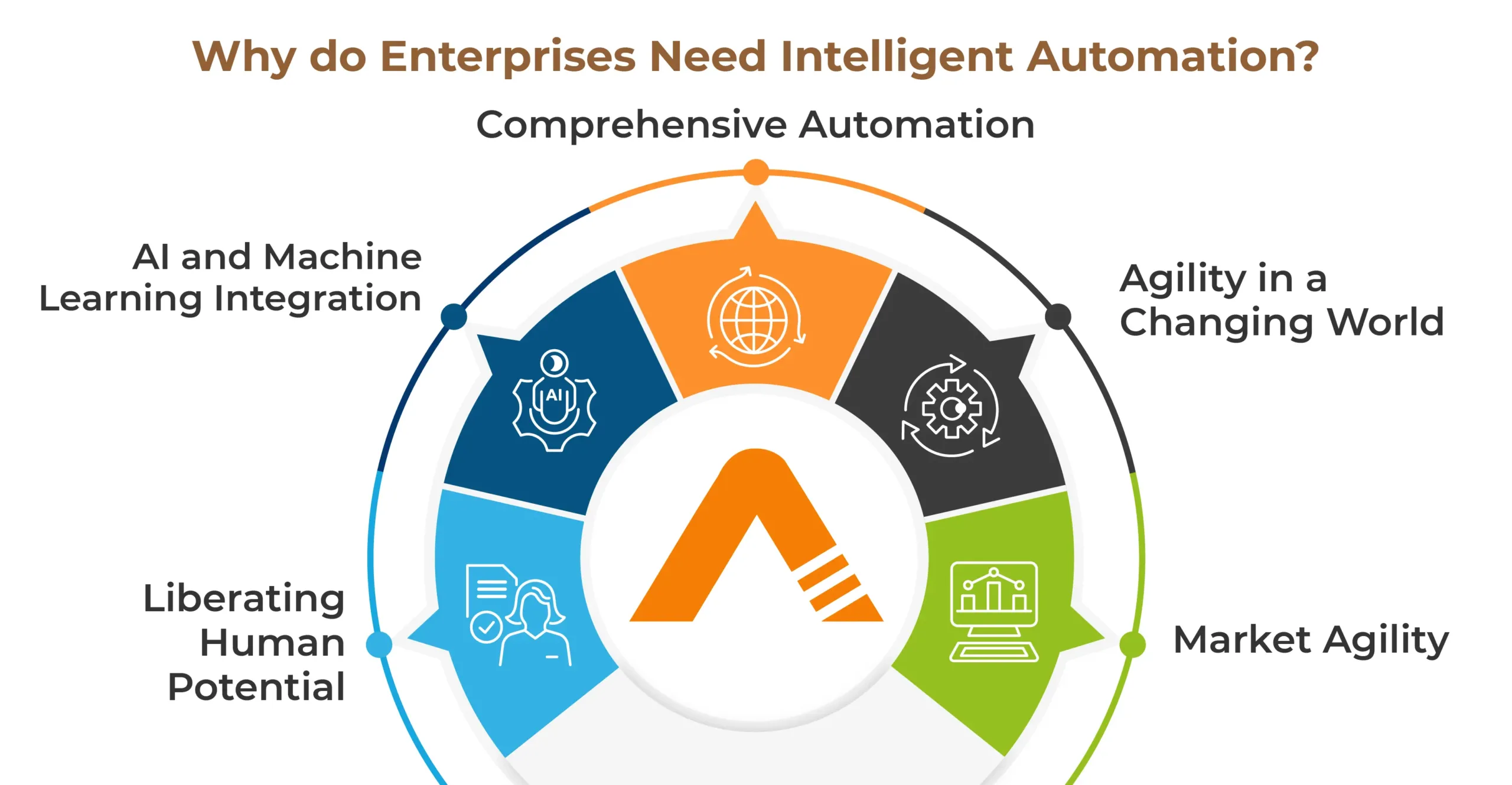Like many professionals, you’ve likely attempted to streamline your operational processes through automation. Nevertheless, certain tasks have proven resistant to full automation, or so you might have believed. This is where Intelligent Automation, also referred to as Intelligent Process Automation (IPA), comes to the rescue.
According to a report, the Intelligent Automation market size was evaluated at USD 13.2 billion in 2022 and is projected to hit USD 51.35 billion by 2032. Intelligent Automation offers the capability to handle a wide range of tasks, from scheduling social media posts to responding to customer inquiries. What sets it apart is its ability to continually learn and enhance accuracy and efficiency over time.
If you’re seeking a solution to alleviate some of the manual burdens you face, Intelligent Automation is the answer to the challenges.
In this article, we will delve into why businesses should use technologies like intelligent automation to accelerate process efficiency and add intelligence to it.
How Does Intelligent Automation Work?
Intelligent Automation, or Intelligent Process Automation (IPA), combines AI, machine learning, and RPA to automate tasks. Let’s have a look at the four pillars of Intelligent Automation.

-
Robotic Process Automation (RPA)
RPA is the foundation of intelligent automation. It enables the creation of software robots (or “bots”) that can mimic human actions in digital systems. These bots can perform tasks across various applications and systems 24/7, without the need for breaks or sleep.
-
Artificial Intelligence (AI)
AI capabilities, such as natural language processing (NLP) and machine learning, enable machines to understand, interpret, and make decisions based on data. This empowers businesses to automate complex tasks that previously required human intervention.
-
Data Analytics
Data is the lifeblood of intelligent process automation. Enterprises can harness the power of big data and analytics to gain valuable insights, make informed decisions, and continuously improve processes.
-
Cognitive Automation
Cognitive automation takes things a step further by incorporating human-like cognitive abilities into software robots. This includes understanding context, reasoning, and making judgment calls, enabling bots to handle even more complex tasks.
Why do Enterprises Need Intelligent Automation?
One might initially ask, “What’s the significance of Intelligent Automation?” The answer lies in the fact that AI-driven automation takes your existing processes to a higher plane, surpassing traditional systems that rely solely on conditional “if this, then that” logic.
The adoption of intelligent automation is becoming increasingly prevalent among businesses, and there are numerous compelling reasons behind this growing trend.

-
Comprehensive Automation
By combining technologies like artificial intelligence (AI) with robotic process automation (RPA), intelligent process automation offers capabilities beyond what RPA can achieve alone. This includes integration with natural language processing (NLP), machine learning (ML), optical character recognition (OCR), and business process management (BPM) to solve complex organizational challenges.
-
Agility in a Changing World
In a constantly evolving environment with shifting regulations, intelligent automation solutions provide the agility necessary to stay compliant and responsive. It helps organizations efficiently process vast amounts of unstructured data using AI and NLP, ensuring the right information is readily available.
-
AI and Machine Learning Integration
Intelligent automation platforms seamlessly connect advanced AI and machine learning with existing data sources, even if these systems are custom-built. This flexibility allows for easy evaluation of data within these systems.
-
Market Agility
Intelligent automation solutions are a significant driver of organizational agility. By utilizing stable foundational systems and adapting quickly to intelligent automation technologies like RPA and AI, organizations can seize new opportunities and effectively manage risks in the market.
-
Liberating Human Potential
Intelligent automation solutions liberate employees from repetitive and time-consuming tasks, enabling them to focus on higher-value, creative, and strategic work. This shift aligns with the increasing demand for higher cognitive skills, such as creativity, critical thinking, and complex problem-solving, which will remain essential through 2030.
What Future Holds for Intelligent Automation?
The possibilities are endless when you see automation as a spark for innovation and opportunity. Your organization could benefit greatly from it for this reason alone.
The benefits of intelligent automation extend to all aspects of your organization’s operations. So it is time to evolve with intelligent process automation all across your business process. While there are many benefits to using intelligent automation, organizations should also be mindful of potential challenges, such as the need for initial investment, integration complexities, and workforce reskilling. Nonetheless, for most enterprises, the advantages of intelligent automation far outweigh the drawbacks, making it a valuable tool for achieving operational excellence and competitiveness in today’s business landscape
The post Enterprise Intelligent Automation: Reasons to Implement It appeared first on AutomationEdge.
This is a companion discussion topic for the original entry at https://automationedge.com/blogs/enterprise-intelligent-automation-reasons-to-implement-it/